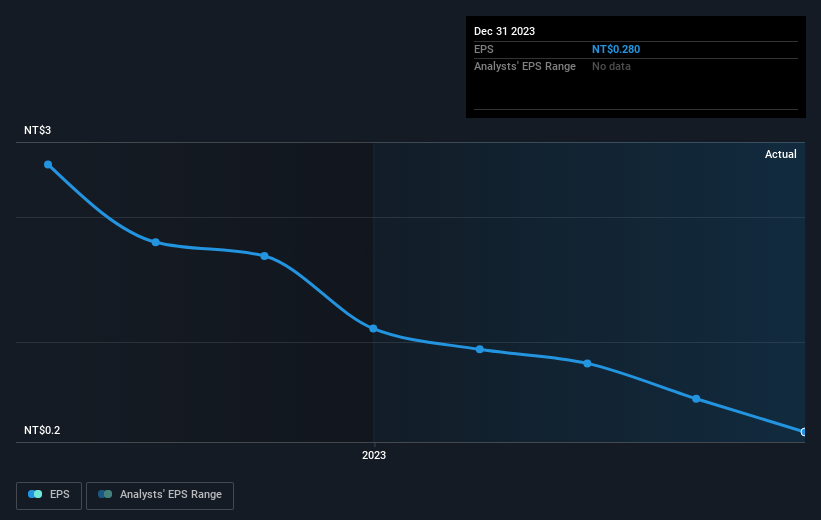- Taiwan
- /
- Metals and Mining
- /
- TWSE:2038
Hai Kwang Enterprise (TWSE:2038) delivers shareholders impressive 26% CAGR over 5 years, surging 19% in the last week alone

The worst result, after buying shares in a company (assuming no leverage), would be if you lose all the money you put in. But on the bright side, if you buy shares in a high quality company at the right price, you can gain well over 100%. One great example is Hai Kwang Enterprise Corporation (TWSE:2038) which saw its share price drive 191% higher over five years. Better yet, the share price has risen 19% in the last week.
Since it's been a strong week for Hai Kwang Enterprise shareholders, let's have a look at trend of the longer term fundamentals.
Check out our latest analysis for Hai Kwang Enterprise
While markets are a powerful pricing mechanism, share prices reflect investor sentiment, not just underlying business performance. By comparing earnings per share (EPS) and share price changes over time, we can get a feel for how investor attitudes to a company have morphed over time.
During the five years of share price growth, Hai Kwang Enterprise moved from a loss to profitability. That kind of transition can be an inflection point that justifies a strong share price gain, just as we have seen here.
The graphic below depicts how EPS has changed over time (unveil the exact values by clicking on the image).

This free interactive report on Hai Kwang Enterprise's earnings, revenue and cash flow is a great place to start, if you want to investigate the stock further.
What About The Total Shareholder Return (TSR)?
We've already covered Hai Kwang Enterprise's share price action, but we should also mention its total shareholder return (TSR). Arguably the TSR is a more complete return calculation because it accounts for the value of dividends (as if they were reinvested), along with the hypothetical value of any discounted capital that have been offered to shareholders. Its history of dividend payouts mean that Hai Kwang Enterprise's TSR of 214% over the last 5 years is better than the share price return.
A Different Perspective
Hai Kwang Enterprise shareholders gained a total return of 3.3% during the year. Unfortunately this falls short of the market return. On the bright side, the longer term returns (running at about 26% a year, over half a decade) look better. Maybe the share price is just taking a breather while the business executes on its growth strategy. I find it very interesting to look at share price over the long term as a proxy for business performance. But to truly gain insight, we need to consider other information, too. Like risks, for instance. Every company has them, and we've spotted 2 warning signs for Hai Kwang Enterprise (of which 1 shouldn't be ignored!) you should know about.
We will like Hai Kwang Enterprise better if we see some big insider buys. While we wait, check out this free list of growing companies with considerable, recent, insider buying.
Please note, the market returns quoted in this article reflect the market weighted average returns of stocks that currently trade on Taiwanese exchanges.
Valuation is complex, but we're here to simplify it.
Discover if Hai Kwang Enterprise might be undervalued or overvalued with our detailed analysis, featuring fair value estimates, potential risks, dividends, insider trades, and its financial condition.
Access Free AnalysisHave feedback on this article? Concerned about the content? Get in touch with us directly. Alternatively, email editorial-team (at) simplywallst.com.
This article by Simply Wall St is general in nature. We provide commentary based on historical data and analyst forecasts only using an unbiased methodology and our articles are not intended to be financial advice. It does not constitute a recommendation to buy or sell any stock, and does not take account of your objectives, or your financial situation. We aim to bring you long-term focused analysis driven by fundamental data. Note that our analysis may not factor in the latest price-sensitive company announcements or qualitative material. Simply Wall St has no position in any stocks mentioned.
About TWSE:2038
Hai Kwang Enterprise
Engages in the manufacturing and trading of steel bars and blanks in Taiwan.
Low with poor track record.


